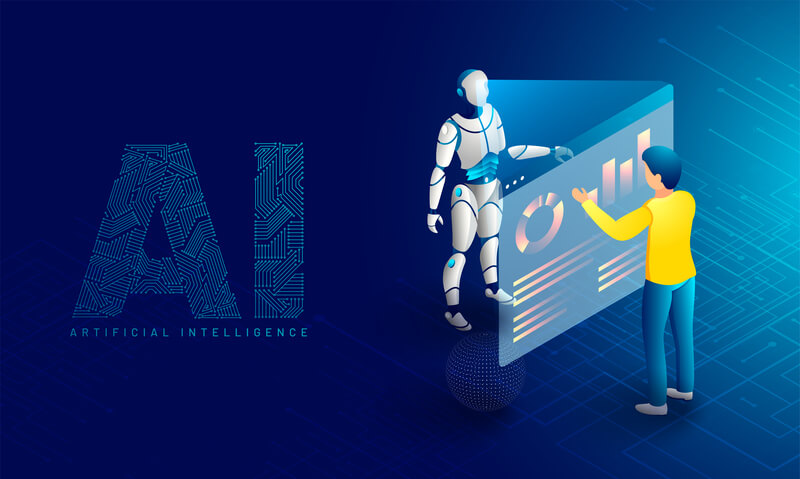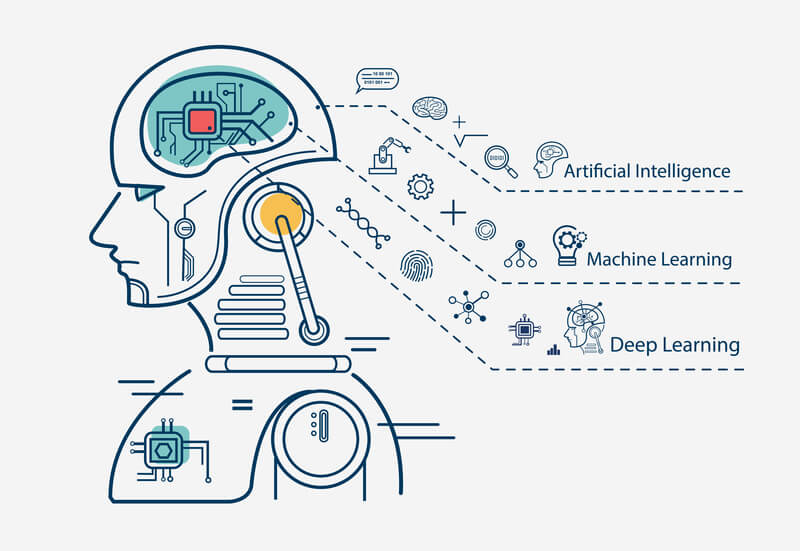Role of AI in Industrial 4.0

In recent years, there has been a lot of buzz, hype and excitement around artificial intelligence (AI) and the Internet of Things (IoT). COVID-19 has acted as a catalyst and is further accelerating the rise of the Digital Economy. The digitisation of businesses and governments is only going to increase further from here and at a breath-taking pace too.
Industry 4.0 will be a predicted paradigm shift through bots, e.g. human-robots interaction, cyber-physical systems, driverless cars, etc.
While there have been concerns to implement AI within the manufacturing sector, AI technologies have made tangible improvements to the supply chain and other related functions. Having said that, the manufacturing sector continues to rely on experience, intuition and judgement of their skilled employees for numerous activities and needs to be addressed especially when production must be scaled. This is where manufacturers must think of ways that the combined expertise of the human-robot collaboration can work.
Going forward, while AI is expected to play a central role in Industry 4.0, IOT, quantum computing and 3D printing are all expected to be part of the massive change. As things unfold, we are entering into an exciting world of AI, neural networks, ML, cybernetics, and deep learning. In the future, a smart factory would have humans and cyber-physical systems interacting over the cloud. Remote monitoring of processes and decisions using big data analytics is also bound to happen.
Machine learning is a subset of artificial intelligence. AI and ML technologies are mainly driven by predictive analytics, cloud computing and big data analytics. The reasons for most companies to shift towards Industry 4.0 and automate manufacturing include enhancing productivity, reducing errors and optimisation of production costs.
Industry 4.0 is expected to benefit tremendously from Machine Learning methodologies. Some of these benefits include:
- Enabling machines, humans, software systems, and products interact over the internet
- Advanced digitised networks can be installed for data collection and transfer
- Automating Inspections, supervision, modifications, and communication
There could be a slow uptake initially in regards to AI adoption in the manufacturing sector since it may be considered as a complex and expensive proposition. However, one cannot deny high-efficiency gains and smoother production workflow if AI and IoT are adopted and implemented correctly.

Artificial Intelligence and Machine Learning has limitless potential and applications in various industries
Adoption of AI in the Manufacturing Sector:
A few areas that will flourish with the adoption of AI in the manufacturing sector:
- Real-Time Inventory Optimisation – This cuts across supply chains and helps in monitoring progress real-time along with resource allocation optimisation through ML and NLP algorithms.
- Human and Robot Combo – Integrating industrial robots will be a major game-changer in regards to adoption of AI in the manufacturing sector. According to the International Federation of Robotics (IFR), there were more than 2.7 million industrial robots implemented across factories all over the world (as of Oct 2020) and this number is only going to increase manifold as robots eventually take over an advanced role in aspects such as programming and designing.
- Scaling and Simulating – This is likely to become much simpler with AI taking over core processes. AI will eventually start creating designs taking specific inputs related to raw materials, design as well as cost from the customer.
- Predictive Analysis – Using ML to predict energy consumption and automate energy management functions dynamically.
The AI and ML Impact on Industry 4.0
The AI and ML impact on Industry 4.0 can be categorised into 5 main areas i.e.
- Predictive Maintenance: Machine Learning technology has the capability to dynamically adjust to new data, analyse and understand the actions in real-time.
- Smart and Agile Manufacturing: Deep learning provides advanced analytics tools for processing and analysing big manufacturing data. Artificial intelligence and Big Data analytics are making machines smarter than before. As a subset of AI, ML is the key fulcrum of such innovations in the manufacturing sector.
- Production Optimisation: AI implementation in production/industries can function at an exceptional speed while reducing costs and enhancing customer experience. The combination of AI and ML technologies can predict failures and prevent machine downtime, manage inventory, and work on delivering the highest quality products.
- Quality Enhancement: With the help of AI and ML technologies and algorithms, an alert can be sent to plant heads even if there is a minor issue that is detected leading to avoiding unwanted outages. The AI and ML algorithms are being leveraged to identify trends and patterns in the data.
- Change Management and Ability to shift gears on short notice: Adapting production to real-time demand (especially during COVID-19) is a big concern for the manufactures. AI algorithms can be used to understand the market and identify demand-supply patterns categorised by date, location, socioeconomic variables, macroeconomic indicators, political factors, weather change patterns, and many more. This can be a huge game-changer for the company and will help manufacturers make better financial decisions during these uncertain times.

Robotics is being utilised in factories all across the world
AI Use Cases
Many global MNCs such as Tesla, Siemens, BMW, Nissan, LG, etc., are using AI in their manufacturing processes. Nokia has launched a video application that uses machine learning to monitor an assembly line process in one of its factories in Oulu, Finland. Siemens is now using this prior experience to make headway in the manufacturing sector, using AI to monitor different variables (for example: temperature) on their turbines, which then adjusts the operation of the machine for increased efficiency.
Komatsu Ltd, a Japanese construction major, now provides its customers with drones to monitor construction sites. The data these drones collect is processed by the company’s AI algorithms to create 3-D maps and extract construction blueprints. Danone Group, a French multinational is using an ML system to improve planning coordination across sales, marketing, key account management, supply chain, and finance, leading to more accurate forecasts.
GE is building an array of AI-enabled digital twins in order to make significant operational savings. The digital twins are digital reproductions of the company’s physical assets, each capable of showcasing the real-time status of its physical twin based on insights and intelligence collected from sensors in the equipment.
Thales SA, a leading supplier of electronic systems is using machine learning to predict preventative maintenance for high-speed rail lines throughout Europe. KUKA, a European manufacturer of industrial robots, has tied up with Huawei, to develop a global network of AI-powered manufacturing robots.
BMW Group is using AI to evaluate component images from its production line, allowing it to spot, in real-time, deviations from quality standards. Nissan is now leveraging AI to design new models in real-time, hoping to reduce time-to-market for the next-generation model series.

Collaboration, co-operation and co-existence across the AI ecosystem is key to success
Final Thoughts: Preparing for the Future
As Industry 4.0 continues to evolve, companies can achieve large scale success by pursuing continuous marginal improvements. Companies evolving within Industry 4.0 require a broad perspective and a deep understanding of the integrations between core technologies. By taking this approach, industrial enterprises can better gauge the appropriateness of specific technologies and how these solutions fit long term objectives. Perhaps most importantly, businesses need to become familiar with how data flows through their organisation.
Currently, businesses are not just talking about software, algorithms, automation, robots, and hardware, but discussing more compound concepts like designing and producing goods on demand, dematerialisation, and disintermediation. Additionally, you need systems in place that can coordinate various artificial intelligence systems to prevent artificial intelligence islands.
Success has not and will not come by one organisation working in isolation when it comes to their AI strategy. Instead, collaboration, co-operation and co-existence with different players across the wider AI ecosystem will be the key to success. Instead of trying to build the supporting technology themselves, many manufacturing companies are entering into collaborations within their ecosystems, wherein each participant brings its unique experience, knowledge, IP and value to the solution.
One thing is loud and clear – Artificial Intelligence Is Here to Stay. Manufacturers who embrace AI will be able to leapfrog and will remain relevant and thrive in this age of Digital transformation! I would end it with this famous quote from Dave Waters:
“Listening to Bill Gates, Elon Musk, and Stephen Hawking talk about Artificial Intelligence reminds me of the Jurassic Park scene where they talk about Chaos theory.”

Gaurav Dua is a Partner and Global Head (KaaS) at Frost & Sullivan with rich and deep expertise in building Research and Advanced Data Analytics Center of Excellence (COE) for many Fortune 500 companies.




